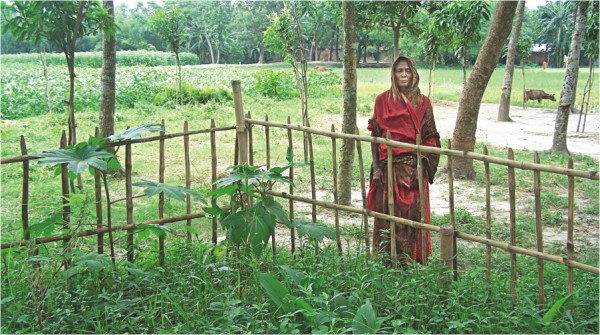
First successful guerrilla leader Shahed Ali
It happened in Rangpur on 23 March 1971.
Khijiruddin was a peasant in the village of Shammanipur under the Kotwali thana, 5 km south of the Rangpur Cantonment. Khijiruddin had four sons and four daughters. Shahed Ali was Khijiruddin's eldest son. Despite being admitted to Munshipara Keramotia High School in Rangpur town, because of his family's financial situation, Shahed could not pursue his education. Instead, he had to look for work.
One day, Shahed sought the advice of Ali, a local butcher. Given his strong features, Ali suggested Shahed should work as a butcher. Despite his father's misgivings because butchery was not considered a respectable profession, Shahed became Ali's apprentice in a butcher shop in Lalbag Hat.
In Shammanipur, Shahed was well-known for being a helpful man, always ready to assist anyone during a crisis. He was bright and decisive, and at the centre of all social activities of the village. When he was twenty-two, Shahed's marriage was arranged to thirteen-year old Ashrafunnesa from the nearby Pathanpara village. He got married a second time, to Kamala Bibi, a divorcee from Molatol, a village adjacent to Shammanipur. Kamala Bibi being a very beautiful woman used to be called as Kamala Sundari by the villagers.
 Shahed Ali's wife in front of his grave. Photo: Col Sajjad
Shahed Ali's wife in front of his grave. Photo: Col Sajjad
With the beginning of March, 1971, Bangabandhu Sheikh Mujibur Rahman had begun to lead a national non-cooperation movement against the Pakistani military, demanding that power be peacefully handed over to the newly elected legitimate government in East Pakistan. In a retaliatory response, the Pakistan military in Rangpur Cantonment began to regularly raid the nearby villages for cattle, poultry, vegetables and grains.
Shahed was amongst the millions who listened to Bangabandhu Sheikh Mujibur Rahman's historic March 7 speech, where Bangabandhu called on the people to defend themselves, with whatever necessary means, against the Pakistani military's brutality. Inspired, Shahed gathered a group of ten friends to prepare for resistance. On March 23, 1971, at around 10 in the morning the Pakistani military arrived in Shammanipur.
The eleven friends, including Shahed moved to the adjacent village of Damodorpur. There, hidden amongst some bushes on a knoll, they saw a Pakistani military jeep approaching the village, moving slowly through the muddy track. Shahed recognized army Lieutenant Abbas of the 29 Cavalry Regiment (Tank Regiment) of the Rangpur Cantonment along with four armed soldiers in the jeep. It was easy to recognize Lieutenant Abbashe had frequently led the seizure of livestock and grains in Shammanipur.
From the knoll, hidden by a thicket of bushes, Shahed shared his plan with his friends. He was the first to jump and hit an officer and his team, with knives and sticks while his guerrilla friends attacked the other soldiers and caused serious casualties on them. The driver of the vehicle, who claimed he was a Bengali, was spared. All the arms and ammunitions were taken by Shahed and his friends.
The success of Shahed and his friends brought cheers from the villagers. But there was a new wave of concern about retaliation from the Pakistani military on Shammanipur. Shahed requested Nurul Islam, a Bengali driver of the village to take the vehicle to a marshy land near Dangirpar village about 6 km away from Shammanipur. He then punctured the jeep's tyres. All the Pakistani soldiers were thought to be dead.
The Commanding Officer of 29 Cavalry Lt. Col. Shah Mohammad Sagir sent a fighting patrol to rescue the missing team of Pakistani soldiers. The jeep was finally recovered with the bodies of the soldiers, and Abbas, who was still alive, was sent to a military hospital, but he succumbed to his injuries on March 24.
The March 25 crackdown by the Pakistani military on the Bengali population, made Shahed realize he was no longer safe in Shammanipur. He decided to return to Lalbag Hat and continue working as a butcher. On April 7, a village informant Gatia Amjad secretly led the army to the place where Shahed worked. Shahed was beaten mercilessly and tortured to death.
Shahed's relatives located his mutilated and brutalized body about 15 km east of Lahirirhat near a pond. As he was being buried, a Pakistani army unit arrived in his village. They beat his first wife with a rifle butt, causing permanent brain injuries from which she never fully recovered. Shahed's second wife Kamala Bibi was dragged into the house by the Pakistani soldiers and raped repeatedly. Later, she died from the injuries.
Shahed Ali was perhaps the very first Bengali guerrilla leaders who, without any formal training or support, embraced his duty to defend his village against the Pakistani military. For his actions, he and his family were made to pay the ultimate price. Shahed's story of sacrifice and the brutality against his wives are a humble reminder of the courage of the ordinary people of Bangladesh who stood up to the Pakistani military, and a call to remember thousands of those who died at their hands.
Written by Lt Col Sajjad.